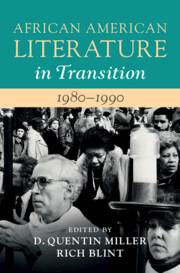Book contents
- African American Literature in Transition, 1980–1990
- African American Literature in Transition
- African American Literature in Transition, 1980–1990
- Copyright page
- Contents
- Notes on Contributors
- Preface
- Introduction
- Part I The Expanding Canon
- 1 Those Dazzling African American Women Writers of the 1980s
- 2 Innovations and Institutions in African American Poetry of the 1980s
- 3 Wideman’s Family Stories and the Carceral Archipelago
- 4 A Queer Reckoning for Black Masculinity
- 5 August Wilson’s Time and History’s Black Bottom
- Part II New Directions/New Literary Forms
- Part III Global Connections
- Index
4 - A Queer Reckoning for Black Masculinity
from Part I - The Expanding Canon
Published online by Cambridge University Press: 02 February 2023
- African American Literature in Transition, 1980–1990
- African American Literature in Transition
- African American Literature in Transition, 1980–1990
- Copyright page
- Contents
- Notes on Contributors
- Preface
- Introduction
- Part I The Expanding Canon
- 1 Those Dazzling African American Women Writers of the 1980s
- 2 Innovations and Institutions in African American Poetry of the 1980s
- 3 Wideman’s Family Stories and the Carceral Archipelago
- 4 A Queer Reckoning for Black Masculinity
- 5 August Wilson’s Time and History’s Black Bottom
- Part II New Directions/New Literary Forms
- Part III Global Connections
- Index
Summary
This chapter critiques a tendency by masculine critics and writers in the 1980s toward binary framing that led to a misassignment of responsibility and misreading of Black women’s literary production.The framework reduces our capacity to read Black literature of this era through its intelligence about gender, to appreciate that Black literature in the 1980s might be read for its attention to and expansion of gender as a category for racial analysis. This chapter animates the gender-thinking in Black male writers’ representations of masculinity by collating the work of Essex Hemphill with that of Ernest J. Gaines. By pairing these two writers, the chapter exemplifies a gender study that refuses the simplistic rejection of Black women’s writing, and instead amplifies the legacy of Black feminist intersectional thought. This comparative reading moves away from pitting Black men against Black women, since to do so is to marginalize writers and their work. Furthermore, it rectifies the general exclusion of queer writers from the category “Black male writers,” akin to the canonical categorization of Black women’s writing that often includes queer women and scenes of queerness.
- Type
- Chapter
- Information
- African American Literature in Transition, 1980–1990 , pp. 77 - 98Publisher: Cambridge University PressPrint publication year: 2023

